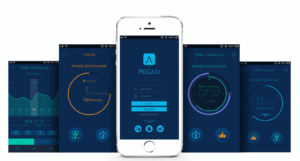Could sleepless nights for insomnia sufferers come to an end? According to one tech company out of Japan, the answer is yes, and the solution is glasses.
Shenzen Qianhai Icecold IT Co. Ltd., a technology development company, has created a new breed of lensless smart glasses that claim to hold the cure to insomnia. These smart classes, called PEGASI, are embedded with LED lights and help to promote healthier sleep habits.
These LEDs reside on the inner edges of the lenseless glasses and emit a soft blue hue when activated. This serves to produce certain wavelengths of light which can affect sleep quality in a positive way by stimulating the hypothalamus gland within the brain. The hypothalamus is responsible for facilitating sleep and other metabolic processes, and controls the secretion of the hormone melatonin, which is produced by the pineal gland. Melatonin aids with sleep and facilitates circadian rhythms in the body. Circadian rhythms are responsible for keeping mammals awake during the day and allowing them to rest at night.
Related: Sleepy Workers are Costing the US How Much??
It has been found that circadian rhythms can be altered or trained to be shorter or longer, thus affecting hours of sleep and the natural cycle of the human body. PEGASI hopes to train circadian rhythms among insomniacs to promote a more regular sleep cycle, providing a non-invasive and non-medical way to do so.
Simply put, insomnia is the inability to fall asleep or stay asleep. While everyone may deal with some type of short-term insomnia in their life, there are some who suffer from chronic, long-term bouts. This can not only affect one’s energy levels, but also impact one’s weight, blood pressure and overall quality of life.
Although PEGASI is not medically certified as a cure or treatment for insomnia, the research proves to be promising. 92 percent of participants who wore the glasses for the prescribed amount of time reported an improvement in sleep. Additional research from NASA and some universities supports these findings.
Related: The Role Sleep Plays in Processing Traumatic Events

In order to reap the full benefits of wearing the glasses, those diagnosed with insomnia are encouraged to keep them on for at least seven minutes each day of the first week, between the hours of 7 a.m. and 9 a.m. Progress can be monitored on a mobile device or smartphone using the PEGASI app. There are also options for energy boosts if the wearer feels sluggish or fatigued.
The medical sleep industry is larger than most may imagine, with over $5 billion generated in the US in 2010, increasing to over $80 billion by 2020 worldwide. This growth is expected to continue rapidly.
“Considering the cost of treating sleep disorders clinically,” said Louis Liu, a sales representative at PEGASI, “we think the glasses can address the needs of at least some sufferers in a less chemically-dependent way, saving them a lot of money in the process.”
Marissa is a health and fitness writer from the Tampa Bay area. In addition to researching the latest trending topics, she enjoys instructing kickboxing classes and posting incessantly to her Instagram account.


![How To: ‘Fix’ Crepey Skin [Watch]](https://cdn.vitalupdates.com/wp-content/uploads/2017/05/bhmdad.png)












